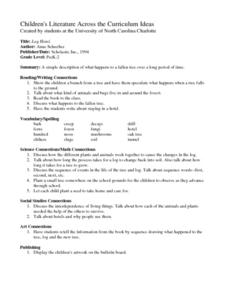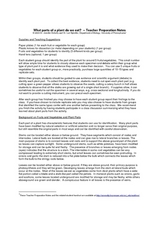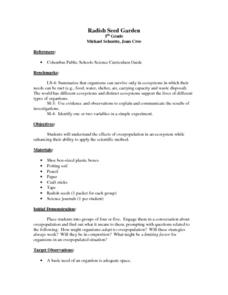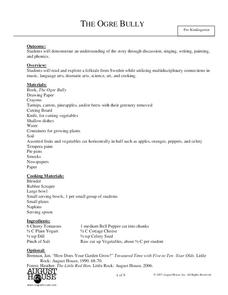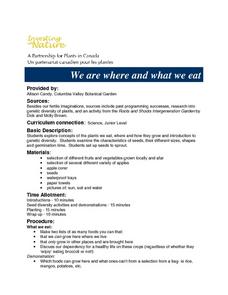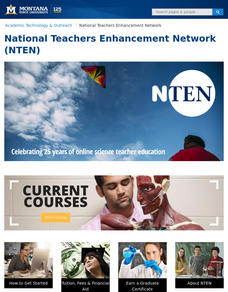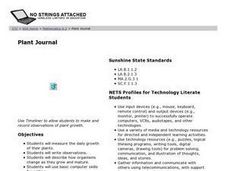Curated OER
Log Hotel
Young scholars identify how the different plants and animals work together to cause the changes in the log. Students discuss the sequence of events in the life of the tree and log. Young scholars plant a seed to take home and care for....
Curated OER
Which Parts of a Plant Do We Eat?
Students identify the different parts of a plant. In this biology instructional activity, students examine its internal parts by dissecting it. They report their findings in class.
Curated OER
Our Changing Environment-- A Demonstration
Young scholars observe and describe changes in an environment when some of the components are changed. They recognize the process of succession by
preparing a miniaturized environment in which a variety of plants and seeds are grown.
Curated OER
Radish Seed Garden
Fifth graders explore the effects of overpopulation in an ecosystem while applying the scientific method. They discuss overpopulation and its meaning. Students as an organism competes for space in an overpopulated area. They plant...
Curated OER
Sunny Sunflowers
First graders, after assessing how plants grow in relation to light, create models of sunflowers within a game to help them remember their science instructional activity. In addition, their visual models serve as a demonstration of photo...
Curated OER
The Ogre Bully
Students listen to the book, The Ogre Bully, and discuss the problems the farmer and his family had during the story. For this garden themed lesson, students examine different fruit and vegetables and plant them in soil to...
Curated OER
We are where and what we eat
Students explore concepts of plants they eat, where and how they grow and are introduced to genetic diversity. They examine seed characteristics, look at their different sizes, shapes and germination time. They also set up seeds to...
Curated OER
Weeds on the Windowsill
Students study farming and reasons to control weeds. They examine pesticides necessary for the control of weeds and the damage to the environment. Through experimentation, students plant seeds in different soils and determine if seeds...
Curated OER
Flower Power
Young scholars investigate and explain the basic needs and life processes of plants. Key concepts include: living things change as they grow and need food, water, and air to survive. The reverse of the Kansas quarter serves as inspiration.
Curated OER
Forget-Me-Knots in a Pot
Students discuss Alaska's state flower and grow their own flowers in pots. They discover skills needed for gardening and plant care. Once students have researched the state flower, they draw pictures of forget-me-knots and list the...
Curated OER
Sprouting Sprouts!
Students plant sprout seeds and make observations. In this lesson about planting, students make observations, predictions, and record information. Students analyze how the sprout plants grow and determine if any of the four sprout seeds...
Curated OER
Dune Plan Adaptations
Students tour Coal Oil Point Reserve. They locate the species of plants that are on the handouts ,and describe the different adaptations used by plants in their specific area of the dunes.
Curated OER
Flowers, Pods, and Seeds
Students gain an understanding of living organisms. the complete a plant growth data log to chart plant growth and to make observations, predictions, and personal reflections.
Curated OER
Observing Root Response After Rotating Plant Ninety Degrees
Students conduct an experiment to observe the response of maize roots when rotated 90 degrees.
Curated OER
Should Soil Be Sterile?
Students determine if the sterilization of topsoil is beneficial to seed germination and plant growth. They grow plants alongside control groups, make and record observations of plant growth and measure plant biomass.
Curated OER
A Garden in the Mailbox
Young scholars study seed catalogs to find information about plants and growing seasons. They write letters requesting a seed catalog after using online resources. They use them complete an associated worksheet and discuss zone maps for...
Curated OER
Archaeobotany
Students study pictures of seeds and the conditions in which they grow during their study of archaeobotany. They infer ancient plant use by looking at archaeobotanical samples. They determine the change of plant use by interpreting a...
Curated OER
Salinity Of Soil
Fourth graders investigate the contents of various types of soil to determine the differences in salinity levels. They conduct an experiment of observing the plants in the different soils. Students then determine survival rates by...
Curated OER
Spring Fling
Students take part in a number of activities that center around a spring theme. They draw the steps to show process of growing seeds.
Curated OER
Using the Scientific Method to Determine Which Conditions Best Favor Plant Growth
Seventh graders examine how the environment can affect biological processes. They identify the best conditions for the germination of bean seeds. They record and analyze their data. They write about their observations in an essay.
Curated OER
Bean and Ozone Project
Students performed an experiment in which they grew beans in an ozone chamber and some in regular air in order to see if the ozone causes damage to the plants.
Curated OER
Plant Journal
Students measure the daily growth of plants in this technology-based science instructional activity that uses Timeliner to record student data. The instructional activity allows students practice at basic computer skills (typing/data...
Curated OER
The Wheat Plant
Students sequence stages in the life of a wheat plant. They identify the six main parts of the wheat plant. They plant some kernels of wheat in the classroom so students can watch the growth and development. They record the plant's...
Curated OER
Jack and the Beanstalk
Third graders read a story and grow a beanstalk. In this literature and life science lesson, the class reads "Jack and the Beanstalk," then lists fairy tale elements and write a puppet show. The students plant pinto beans and observes...


